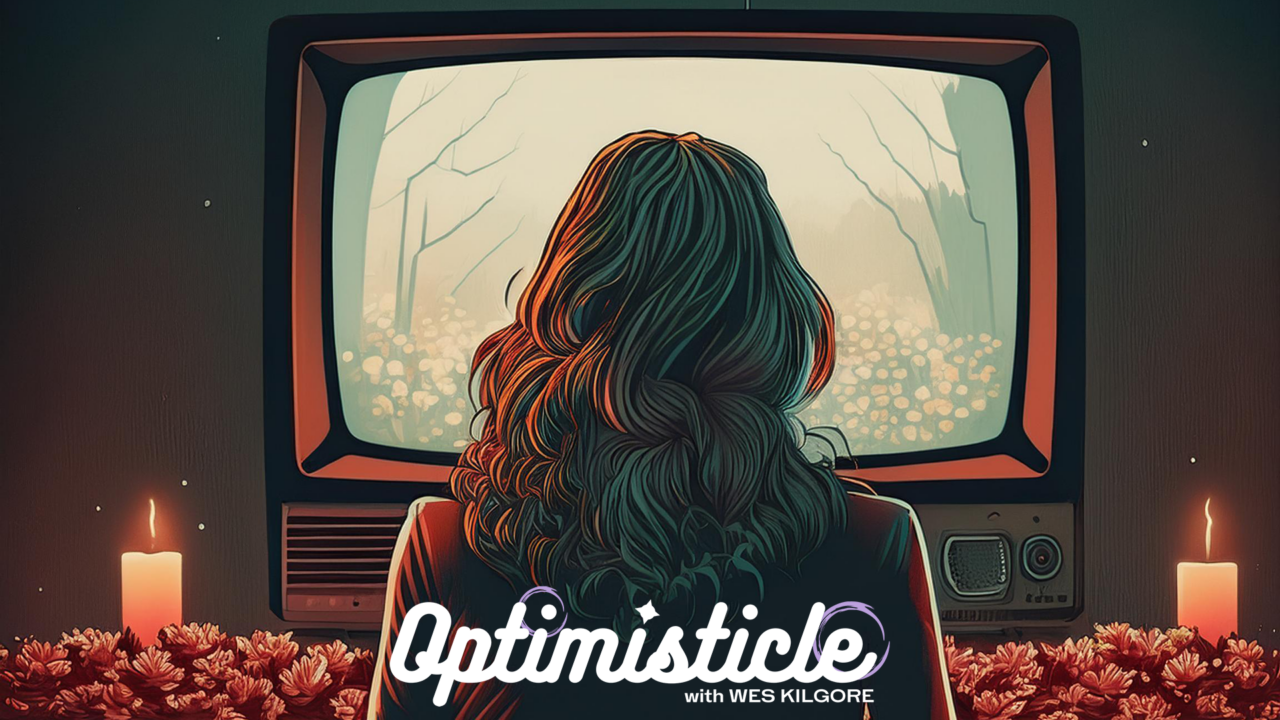
Blog Post
from our Optimisticles blog series
By Wes Kilgore, Well Beings
What’s the first thing that comes to mind when you hear the word “masculinity”? It wouldn’t be surprising if your answer was “toxic masculinity,” which is stereotypical behavior associated with men and generally thought to have a negative impact on society and men themselves. Usage of that phrase has increased exponentially in the past decade, unfortunately leaving many people with the impression that masculinity itself is inherently toxic.
While the effects of “toxic masculinity” have real world implications — a 2019 report by the Pan American Health Organization found that one in five men will not reach the age of 50 in the Americas, due to issues relating to toxic masculinity — it does a disservice to a large portion of our population to simply define them by their worst characteristics. This is where art and music can be helpful. Good art holds a mirror to society and can literally show a more comprehensive reflection of who we truly are. Masculinity is no exception. The artists in this playlist have written songs about the spectrum of masculinity, from predatory to pensive, protective and playful. Hopefully, they’ll help paint a broader picture of what real masculinity entails. And hopefully, someday, “healthy masculinity” will be the first thing that comes to mind when you hear the word “masculinity.”
This is the first in a three-part series of Optimisticles that will explore how concepts about gender are expressed in music.

Masculinity by composer Samora Pinderhughes is the inspiration for this playlist. It is the first release from the 2022 album Grief and is a part of The Healing Project, a multimedia collaboration between Pinderhughes – who has performed at Carnegie Hall and the White House – and filmmaker Christian Padron. The Healing Project explores the daily realities of violence, incarceration, detention, and policing in communities across the U.S.
Toxic masculinity sits squarely at the center of this incredibly moving song and video. Vulnerability and healing are it its core as well. And Pinderhughes’ voice itself challenges traditional concepts of masculinity – before I saw the video, I could have sworn that a woman sang this song. Most of Masculinity is a poignant and painful journey, but at the halfway point, tenor saxophonist, Lucas Pino’s solo masterfully ushers us out of its sonic depths and into a touching celebration of positive masculinity, fatherhood, brotherhood and hope.
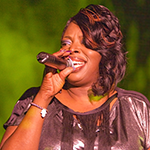
Brotha, from Angie Stone’s 2001 sophomore release Mahogany Soul, is a woman’s anthem to appreciating the worth of men — Black men in particular — and specifically the value of a man’s character vs. his paycheck. Stone discussed what inspired the song in the November 1, 2007 issue of Clutch Magazine: “I can honestly say that in the past, for me – I can’t really speak for everyone else – men have a problem with women who are making more money or who are positioned higher. And it definitely tears down the Black family. I feel like it’s designed that way – that’s why I did the song Brotha. I wanted to make sure that men knew that we are not to judge love by the monetary value in it. We should definitely judge it for the foundation and for the heart and for the genuineness of what love is about as opposed to what it can bring to the table. Love is pure, love is innocent, love is broke.”

Boys Don’t Cry was The Cure’s breakthrough hit from their 1980 album of the same name. The song title clearly states what could be the root cause of “toxic masculinity” — society’s insistence that “real men” (boys in this instance) don’t cry. Some men are not given permission to be vulnerable, and these stifled emotions can lead to a lack of empathy and other deficiencies in emotional wellbeing that can manifest in more problematic ways over time.
In a 2019 interview with Rolling Stone, Robert Smith, lead singer/guitarist/songwriter for The Cure said of the song, “When I was growing up, there was peer pressure on you to conform to be a certain way. And as an English boy at the time, you’re encouraged not to show your emotion to any degree. And I couldn’t help but show my emotions when I was younger. I never found it awkward showing my emotions. I couldn’t really continue without showing my emotions; you’d have to be a pretty boring singer to do that. So I kind of made a big thing about it. I thought, ‘Well, it’s part of my nature to rail against being told not to do something’.”
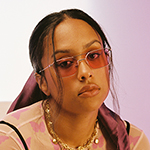
Folk singer/songwriter/guitarist Jensen McRae’s Wolves is a powerful account of the predatory nature of some men. Written by McRae in her early twenties, Wolves recounts the lessons she began to learn in her teens about meeting seemingly harmless men who only wanted to prey on her — aka wolves in sheep’s clothing. Consisting of only a haunting guitar riff, and McRae’s folk-tinged, soulful vocals, the song packs years of world weariness into lines like, “Now I bury my smile and show no interest/ Now I carry myself a little different/ Now I avoid the woods/ Now I know the wolves.”
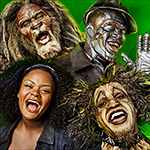
One of the show-stopping moments in NBC’s 2015 broadcast of The Wiz Live! was Ne-Yo’s incredible rendition of What Would I Do if I Could Feel? Originally sung by Nipsey Russell in the film The Wiz, the song serves the same purpose of If I Only Had a Heart from The Wizard of Oz. The lyrics are another thinly–veiled plea for men to have emotional growth. Longing for a heart, the Tin Man sings, “And if tears should fall from my eyes/ Just think of all the wounds they could mend/ And just think of all the time I could spend/ Just being vulnerable again.”
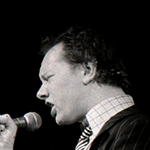
Known primarily for jazzy, piano-driven songs like Steppin’ Out these days, at the start of his career, Joe Jackson fit firmly into the crop of angry young men such as Elvis Costello and Graham Parker, who sprang out of Britain in the late 70s and helped bridge the gap between punk and new wave. Pretty Boys from Jackson’s sophomore LP Beat Crazy shares a similar theme with Dire Straits’ Money for Nothing — both are indictments of male pop stars and celebrities who coast to success on their good looks. Whether the song is delivered with a wink and a nod is unclear, but men, especially men in the entertainment industry, aren’t immune to the pressures of beauty standards. In the song, Jackson sings: “I want to see a human being on my TV set/ Want some action for the fat and thin man/ They’re getting closer but they ain’t got robots yet/ Just a hero with a smile like a tin man/ No brains and no heart/ Just pretty boys.”
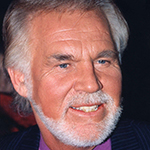
This Country & Western standard was so popular that it inspired a TV movie, Coward of the County, starring Kenny Rogers himself. The song explores some of the core tenets of what is commonly considered masculine behavior: toughness and bravery. It tells the story of an imprisoned father who, with his dying breath, advises his young son, Tommy, to stay out of trouble and to walk away instead of fighting. Following his father’s wish, Tommy’s pacifistic approach to conflict earns him the nickname the Coward of the County. The song culminates with Tommy having to face the choice of whether to turn the other cheek after his girlfriend is assaulted by three brothers, the Gatlin boys, in a bar.
Interesting fact: Roger Bowling, who wrote the lyrics to the song for Kenny Rogers, reportedly chose the name Gatlin for the assailants in the song because of a falling out that he had with Larry Gatlin of The Gatlin Brothers.
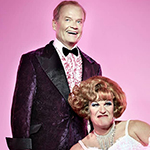
Masculinity is a song in the second act of La Cage Aux Folles. The setup for the song, in a nutshell, is that Georges is attempting to convince his life partner, Albin, a drag queen and the star attraction at Saint-Tropez (a nightclub that Georges manages) to be less flamboyant and pretend to be heterosexual “Uncle Al” in order to prevent spooking Georges’ son’s fiancée’s father, who is the head of a morality organization that wants to end local drag shows.
La Cage Aux Folles was groundbreaking, becoming the first hit on Broadway centered around a gay relationship. It tackled stereotypes about masculinity and femininity that are inherent in most portrayals of homosexuality. And the absurdity of the concept of having to “act like a man” 24/7, while doing every mundane task is driven home with the very first lines of Masculinity:
“I want you to pick up that piece of toast like a man!
Think of this as Masculine toast and Masculine butter,
Ready for spreading by a Masculine hand.
Pick up that knife and make believe it’s a machete.
It’ll take all your strength and steady nerves
For hacking your way through the cherry preserves.”
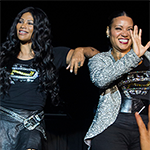
After penning songs that focused on the shortcomings of men such as Do You Want Me and Chick On The Side, Salt-N-Pepa flipped the script on Whatta Man, based on a 1968 song of the same title by Linda Lyndell. The song originally appeared on 1993’s Runaway Love EP by En Vogue and later that year on Salt-N-Pepa’s fourth studio album Very Necessary. Known mostly for their rapping skills, Salt-N-Pepa enlisted En Vogue to sing the hook on the song, and laid out their case for all of the good men out there. According to them, these are men who are secure in their manhood, never disrespectful to women and spend time with their kids

The Cribs pour all of the messiness of their imperfect attempts to define manliness and masculinity into their music. Men’s Needs from their 2007 album Men’s Needs, Women’s Needs, Whatever, was the UK band’s breakthrough hit, and they’ve gone on to be described by Q magazine as “The biggest cult band in the UK”. In Men’s Needs, the band – twin brothers Gary and Ryan Jarman and their younger brother Ross – appear to be outlining a man’s needs from a woman’s perspective… but it’s unclear: “Because a man’s needs, man’s needs/Are found on greed, are found on greed/ A man’s needs, man’s needs/ Are lost on me.”
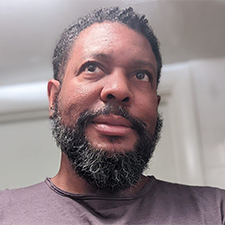
Wes Kilgore is a writer, musician and bon vivant based in the Washington, DC area, and the proud parent of two disturbingly well-adjusted young women and two borderline sociopathic Corgis.
WellBeings.org is a health and wellness resource, not a crisis or suicide response website. If you are in crisis, or experiencing thoughts of suicide, please call or text the 988 Suicide & Crisis Lifeline at 988 or the LGBT National Hotline at (888) 843-4564. The service is free and available 24 hours a day, seven days a week.
How can u write ur own lyrics age of 13?